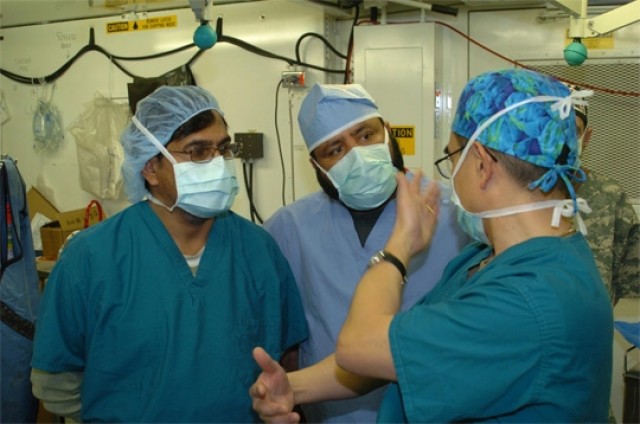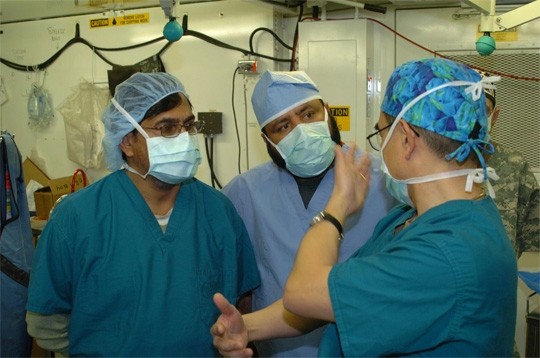BAGRAM AIRFIELD, Afghanistan, Feb. 23, 2007 - Five years ago, Sadrai, an Afghan from Paktika Province, fell off a donkey and broke his arm. After a failed surgery in Pakistan two years later, he waited another three before coming to Bagram so that American doctors would look at it.
But it's not just American doctors who gave him the use of his arm back, Feb. 21.
Dr. Said Wali and Dr. Abdul Khaliq, surgeons from Qalat in Zabul Province, are working side by side with the doctors of Task Force Med while they learn new surgical and management techniques.
The doctors came to Bagram through the efforts of the Qalat Provincial Reconstruction Team.
"Zabul Province is a very poor province that has a severe lack of health care," said Air Force Lt. Col. (Dr.) Christopher Scharenbrock, Qalat PRT chief medical officer. "One year ago, the United Arab Emirates built a hospital there with 150 beds. The Ministry of Health has been trying to get more doctors and equipment there."
The MoH's effort met with limited success. Zabul is so poor, many doctors did not want to work there, but an influx of funds allowed the hospital to offer better pay and equipment.
"They've gone from 4 to 22 doctors over 11 months, from almost no surgeries to 120 per month," Scharenbrock said.
Building and staffing the hospital, difficult as it was, was the easy part. Now, Scharenbrock said, the goal is to improve the quality of care. To that end, the Qalat PRT arranged to bring Wali and Kaliq to Bagram.
"We get experience in both management and medical wards," Wali said. "If there is something new, we make notes to use it in our hospital. Since we work with foreigners, we learn some new techniques here."
"We are working like brothers here," Khaliq said. "They show me everything. I will take these procedures back. When we go, we will know this is correct, and we will follow the procedures like this hospital. This is important because we compare our work in Qalat with Bagram. This is better for our hospital and our doctors."
Maj. (Dr.) Shaun Baker, TF Med orthopaedic surgeon, has been working with Wali and Khaliq during their stay here. He said the TF Med doctors are happy to pass on some of the tricks of the medical trade.
"We enjoy having them here," he said. "I think they've picked up a few things. Hopefully they'll be able to put it to good use."
Scharenbrock said some of the most important things the doctors are learning are not advanced surgical procedures, but simple infection control.
"A lot of times I'd go to their hospital," he said. "When we first got there, people weren't even wearing gloves. It's totally different for them to see how a whole system can work together."
Scharenbrock said change will come slowly, but surely with U.S. help.
"You can't change everything at once," he said. "They are able to pick and choose what they can implement at their organization."
Whatever the eventual outcome, the program already has one fan. After waiting five years, Sardrai will be able to use his arm normally again.
"I'm so happy that Afghan doctors can learn here," he said.


Social Sharing